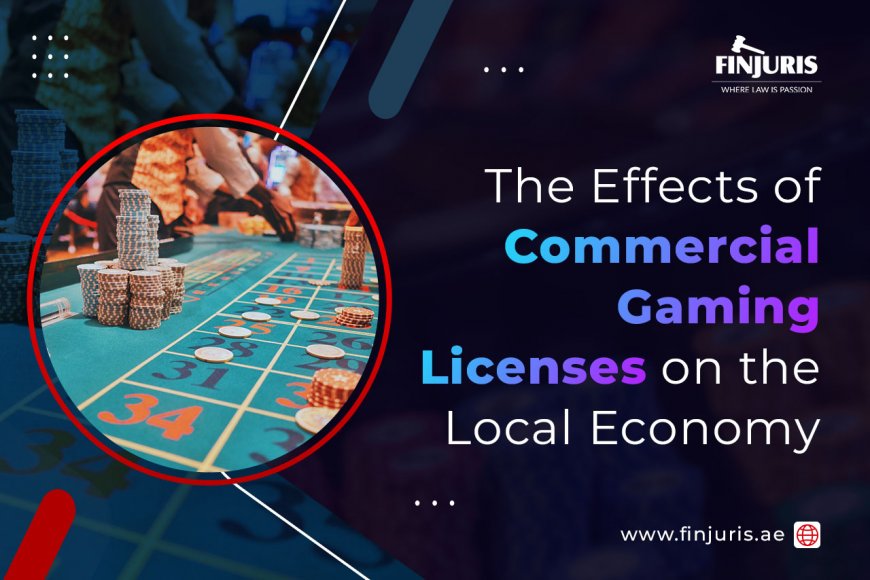The Effects of Commercial Gaming Licenses on the Local Economy
Explore how commercial gaming licenses impact the local economy, boosting job creation, tourism, and tax revenue, while also addressing potential challenges.

Commercial gaming licenses play an important part in a region's economic development. As more governments and jurisdictions legalize and regulate commercial gaming activity, the benefits to local economies become more obvious. From employment development to tourism expansion, commercial gaming licenses help a wide range of businesses and contribute to overall economic prosperity. In this essay, we will look at how issuing these permits can give major economic benefits to towns and regions.
Job Creation and Workforce Development:
One of the most immediate and significant advantages of granting commercial gaming licenses is the development of jobs. The gaming sector employs a diverse spectrum of people, from casino dealers and croupiers to security officers, customer service representatives, and IT professionals. However, the economic impact of employment creation goes beyond the casino floor.
Direct Jobs: Casinos and gaming institutions need a range of professions, including:
-Dealers, pit bosses, and game floor attendants
-Hospitality employees (e.g., chefs, waiters, bartenders)
-Security and surveillance teams.
-Administrative and management roles
Indirect Jobs: The growth of a significant casino or gambling resort frequently leads to the creation of jobs in other areas, such as:
-Construction workers to build or renovate casinos and hotels.
-Maintenance staff to manage large-scale facilities.
-Transportation services include taxi drivers, shuttle buses, and even ride-sharing services.
-Marketing and promotional professionals can assist casinos in reaching out to potential visitors.
Overall, the creation of thousands of jobs has the potential to dramatically reduce local unemployment rates and contribute to workforce development, with many regions providing training and educational programs to help local citizens gain the necessary skills to work in the gaming and hospitality industries.
Tourism & Destination Development:
Commercial gaming operations, particularly large casinos and integrated resorts, can serve as major attractions, attracting travelers from all over the world. Gaming licenses are frequently issued in conjunction with increasing infrastructure investment and the development of tourism-related services.
Increased Visitor Numbers: Casinos are frequently used as anchor attractions in tourism locations, enticing people to travel from far and wide to visit. Tourists are drawn to gaming sites because they offer a variety of entertainment alternatives, including gambling, live events, and luxury lodgings.
Tourist Spending: Visitors to gambling sites spend money not only at the casino, but also in other parts of the local economy.
Tax Revenues For Local and State Governments:
Governments that give commercial gaming licenses often levy a tax on gaming earnings, which is an important source of revenue for local and state budgets. These taxes can be large, allowing governments to fund a variety of public services, infrastructure, and community development activities.
Tax Revenue from Gambling: Commercial gaming operators are normally taxed on their gross gaming revenue (GGR) or net profit, with rates varying by jurisdiction. These money are frequently set aside for public uses, such as education, healthcare, and law enforcement. In certain areas, gaming taxes account for a sizable amount of the state or municipal budgets.
Job and Payroll Taxes: In addition to gaming taxes, the gaming sector creates jobs that pay payroll taxes to municipal and state governments. These levies support social services and local infrastructure initiatives.
Funding for Local Projects: Many states and towns use gaming taxes to fund specialized initiatives including road upgrades, public safety, tourism marketing, and community welfare programs. Certain states, for example, have set aside gaming tax revenue to fund schools, low-income housing, and local emergencies.
Ancillary Industries Include Hospitality, Entertainment, and Retail:
The economic benefits of awarding commercial gambling licenses go far beyond the casino floor. The establishment of casinos and gaming resorts stimulates the growth of a diverse variety of auxiliary companies that support the gaming activity itself.
Hospitality and accommodations: Integrated resorts frequently contain major hotels, resorts, and conference centers that cater to both tourists and business travelers. This helps the local hospitality business by expanding the number of lodging options, which supports local hotels, motels, and vacation rentals.
Entertainment and Events: Commercial gambling facilities are sometimes part of bigger entertainment complexes that include theaters, concert halls, and event spaces. The demand for concerts, shows, and sporting events generates cash for local entertainment firms, including promoters, technicians, and stagehands.
Retail and Restaurants: Major casinos frequently have high-end retail stores, restaurants, and bars. These facilities attract both locals and tourists, which benefits retailers, suppliers, and service providers. As casinos gain popularity, there is a greater demand for a variety of dining alternatives, ranging from informal cafés to gourmet restaurants.
Real Estate Development: Casinos frequently act as spurs for larger urban development. Local real estate markets may enjoy a boom as developers construct more hotels, office spaces, residential units, and shopping malls to accommodate the inflow of visitors and workers. This can result in higher property values and a more dynamic, diverse economy.
Long-Term Economic Development and Investment:
In many circumstances, granting commercial gambling licenses might indicate long-term economic growth. When a government or territory legalizes and controls gaming, it frequently attracts significant private investment to the region. This investment can take a variety of forms, including:
Infrastructure Development: Casinos frequently invest in improving local infrastructure, such as roads, public transportation systems, and utilities. These upgrades benefit the entire community, not just casino operators.
Diversification of the Local Economy: As casinos and gaming resorts grow, they assist to diversify the local economy, making it less reliant on a particular industry or sector. For example, a region that was formerly mostly focused on agriculture or manufacturing may undergo a transformation into a more diverse, service-oriented economy.
Attracting More Investment: The presence of a commercial gaming license can increase a jurisdiction's appeal to other investors and sectors. This could lead to the creation of other industries, such as technology, entertainment, and finance, that supplement the gaming business and contribute to long-term economic sustainability.
The issuance of commercial gaming licenses is not just about regulating the gaming industry; it is also a key driver of local economic development. From job creation and tourism growth to increased tax revenues and the expansion of ancillary industries, the positive economic ripple effects of legalized commercial gaming are wide-reaching. While there are certainly challenges and regulatory concerns to address, the economic benefits to local communities and regions are clear, making the decision to issue commercial gaming licenses an important one for economic policymakers looking to stimulate growth and improve public services.
What's Your Reaction?




















